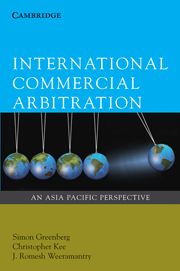Book contents
- Frontmatter
- Contents
- Foreword
- Preface
- Table of Cases
- Table of Statutes
- 1 Introduction to international arbitration and its place in the Asia-Pacific
- 2 Law governing the arbitration and role of the seat
- 3 Applicable substantive law
- 4 Arbitration agreement
- 5 Arbitral jurisdiction
- 6 The arbitral tribunal
- 7 Procedure and evidence
- 8 The award
- 9 The award
- 10 Investment treaty arbitration
- Appendix 1 Asia-Pacific arbitral institutions at a glance
- Appendix 2 Selected arbitral institutions
- Appendix 3 List of UNCITRAL Model Law countries
- Appendix 4 List of parties to the New York Convention 1958
- Appendix 5 Selected list of Asia-Pacific arbitration legislation and instruments
- Glossary
- Index
10 - Investment treaty arbitration
Published online by Cambridge University Press: 05 June 2012
- Frontmatter
- Contents
- Foreword
- Preface
- Table of Cases
- Table of Statutes
- 1 Introduction to international arbitration and its place in the Asia-Pacific
- 2 Law governing the arbitration and role of the seat
- 3 Applicable substantive law
- 4 Arbitration agreement
- 5 Arbitral jurisdiction
- 6 The arbitral tribunal
- 7 Procedure and evidence
- 8 The award
- 9 The award
- 10 Investment treaty arbitration
- Appendix 1 Asia-Pacific arbitral institutions at a glance
- Appendix 2 Selected arbitral institutions
- Appendix 3 List of UNCITRAL Model Law countries
- Appendix 4 List of parties to the New York Convention 1958
- Appendix 5 Selected list of Asia-Pacific arbitration legislation and instruments
- Glossary
- Index
Summary
Introduction
In the last decade, investment treaty arbitrations have rapidly increased in number and in significance. As its name suggests, this area of arbitration is based on treaties that enable a foreign investor to claim for loss or damage relating to its investment against a state in which that investment has been made. The three most distinctive features of this form of arbitration in comparison with international commercial arbitration are that:
(i) There is at least one state (or state entity) that is a party to the proceedings, whereas international commercial arbitration does not necessarily involve a state party.
(ii) The legal rights invoked generally arise out of treaties and public international law, rather than from domestic law or contracts.
(iii) In the case of ICSID arbitrations, the arbitral process is almost completely delocalised.
A dedicated chapter on investment treaty arbitration is included in this book not only because of its growing importance and frequency of use but also because it provides a wealth of comparative material for international commercial arbitration.
This chapter proceeds with an overview of international investment law in Section 2. Investment treaties and their dispute settlement clauses are discussed in Section 3. Various features of ICSID and its jurisdictional requirements are examined in Section 4. The chapter then deals with the advantages, disadvantages and innovative features of the ICSID Convention in Section 5. Substantive aspects of international investment law are briefly surveyed in Section 6. Section 7 outlines the remedies available under investment treaties.
- Type
- Chapter
- Information
- International Commercial ArbitrationAn Asia-Pacific Perspective, pp. 477 - 504Publisher: Cambridge University PressPrint publication year: 2010



